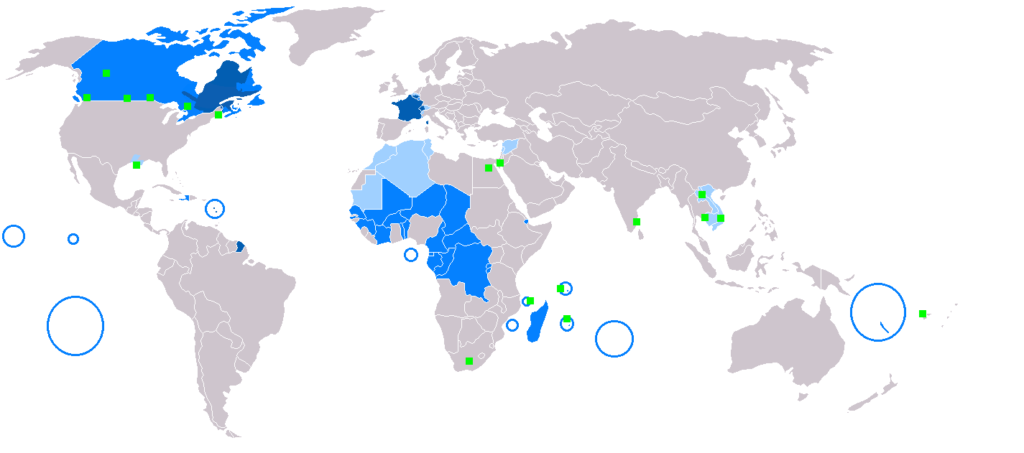French is a beautiful language. And it’s increasingly popular to learn. Thanks to France’s rich history and influence, the language hides a fascinating background too. Learning about this can help you appreciate the language even more. Here are the 14 incredible French language facts:
1. French is a Romance Language
The first of these facts about the French language is probably not that surprising. Since it French comes from Latin, it’s considered a Romance language. But did you know that the type of Latin French descended from is not the same as traditional Latin? It’s called Vulgar (nonstandard) Latin. Vulgar Latin was essentially informal Latin, whereas traditional Latin is what scholars and academics tend to study. All of the Romance languages are descended from Vulgar Latin.
2. L’Académie Française Protects the Language
The literary integrity of the French language has been preserved by the Académie Française since its creation in 1634 by Cardinal Richelieu. The Academy consists of 40 members who oversee the language, adding new words and contemplating changes to modernize the language. Many languages have similar types of academies, except for English.
The Academy recently announced there would be significant changes in the French language in 2016. They voted to remove the use of the circumflex over both the “i” and “u,” changing the spelling of many words. They also voted to change the spellings of some words like “oignon” to “ognon”, which means “onion”. They believe removing some silent letters will make it easier to learn the language.
3. French Is The 6th Most Spoken Language In The World
With nearly 80 million native speakers and over 274 million speakers worldwide, French is one of the most popular languages in the world. In fact, French is an official language of 29 countries and is the sixth most spoken language in the world.
There is also an organization that promotes the global speaking of French known as the Organisation Internationale de la Francophonie (OIF). A francophone is a French-speaking person.
Part of the widespread use of French is a result of Belgian and French colonialism that spread the language around the world. While roughly 40% of French speakers reside in Europe, there are also significant populations of speakers in Africa, Canada, and many other countries.

4. French Popularity is Increasing
Since the end of World War 2, the number of French speakers has tripled. Interestingly enough, the language’s popularity continues to increase as French-speaking countries in Africa continue to grow and develop. Current projections show that the population of French speakers around the world could increase to over 750 million by 2050. This number isn’t too surprising when you take into account that there are currently 500,000 French teachers instructing over 120 million students worldwide.
5. French is an Official Diplomatic Language
The United Nations works in six different languages: Arabic, Chinese, English, Russian, Spanish, and French. But French is also the official working language of other international institutions too. In the European Union, it’s one of three procedural languages, along with German and English. But, the list doesn’t end there. French is also a working language for many international organizations such as UNESCO, WHO, NATO, and others.
6. French Wasn’t Popular in France
This is probably the strangest of these French language facts. The French language wasn’t widely used across France until after the French Revolution. Before this period, France had pockets where various dialects were used. In fact, until the 19th Century, French was used more in Germany and Holland.
7. 29% of English Vocabulary Comes From French
English is indeed a collage of other languages. And while it shares strong similarities to German, its French influence cannot be denied. This is a result of the Norman Conquest of England in 1066 A.D. This invasion resulted in a lengthy infusion of the two languages.
Presently, roughly 50.000 English words come from French. In addition to this influence, there are many modern French loanwords in English as well. A few examples of these are “café,” “déjà vu,” “décor,” “naïve,” and “restaurant.”

8. Counting in French Has a Different Logic
Every language approaches counting in their own, unique way, but with French, it can be seen as strange at times. Nowhere is clearer than between the numbers 80 and 99. While in English you would say “eighty-three,” in French, you would say, “quatre-vingt” or “four twenties. It gets really interesting when you reach 99. Instead of saying, ninety-nine, you would say, “quatre-vingt-dix-neuf” or “four twenties, ten, nine.”
This partial vigesimal system or system of counting by twenty came about after the French Revolution as a way of unifying the counting system. You can see a similar relation in the use of “score” in the English system, though its no longer practiced.
9. French Culinary Words are Global
French cuisine is undoubtedly famous and popular. Their world-renowned dishes are of exceptional quality. However, it’s not just the food that’s globally famous. French words have defined the way food is prepared. Chef, blanching, sautéing, and julienne are some of the cooking terms that originate from French.
10. French Has a Lot of Homophones
These are the type of words that look similar and have almost the same pronunciation. But, their meanings are very different. Learning these may appear challenging, but they make very fun tongue twisters. Here are some famous examples of French homophones:
- Si mon tonton tond ton tonton, ton tonton sera tondu. – If my uncle shaves your uncle, your uncle will be shaved.
- As-tu vu le vert ver allant vers le verre en verre vert ? – Did you see the green worm going towards the green glass glass?
- Cinq chiens chassent six chats. – Five dogs hunt six cats.
11. A Lot of Celebrities Can Speak French
Many of your favorite celebrities can speak French. Watch this video to hear how Joseph Gordon-Lewitt, Tom Hiddleston, Shakira, Jodie Foster, Gwyneth Paltrow, Bradley Cooper, and Johnny Depp speak French:
12. French Doesn’t Have Any Words With “W”
If you find a French word with “w” in it, it’s only because it’s a borrowed word from a different language. Wifi, WC, and web design all come from English.
13. French Media is Popular
France boasts some of the most popular films and books around the world. The French comic, Astérix, showcasing the adventures of a short Gallic warrior is a popular French cartoon. It has sold millions of copies, been widely translated, and made into at least 13 feature films. Antoine Saint Exupéry’s Le Petit Prince or the Little Prince is the most translated non-religious book in the world. Its popularity has led to 300 different translations. And French cinema is second only to Hollywood with over 200 films made each year. France also hosts one of the most prestigious film festivals, the Cannes Film Festival.
14. French is Easier to Learn Than You Think
After reading these facts about the French language, you’ll surely want to learn it too. Thanks to the similarities between English and French, mastering this language isn’t difficult at all. And if you want to reach French fluency in the fastest and most efficient way, OptiLingo makes the process even simpler.
OptiLingo’s mobile language learning app is proven to bring results. Having helped thousands of language learners reach proficiency, the evidence is there. Using cutting edge teaching methods, such as comprehensible input and spaced repetition, you will surely learn the intricacies of the French language. OptiLingo also shows you the most common words. So, you’ll learn exactly how the locals speak. Try FREE today!







